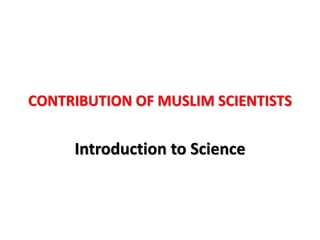
1 CMS.pptx
- 1. CONTRIBUTION OF MUSLIM SCIENTISTS Introduction to Science
- 2. Introduction to Science • Etymology: the word derived from French and Latin word Scientia knowledge or the word scio I know • Definition: Science is a systematic endeavor that build and organizes knowledge in the form of testable explanations and predictions about the universe.
- 3. Introduction to Science Science is the pursuit and application of knowledge and understanding of the natural and social world following a systematic methodology based on evidence. • Scientific methodology includes the following: • Objective observation: Measurement and data (possibly although not necessarily using mathematics as a tool) • Evidence • Experiment and/or observation as benchmarks for testing hypotheses • Induction: reasoning to establish general rules or conclusions drawn from facts or examples • Repetition • Critical analysis • Verification and testing: critical exposure to scrutiny, peer review and assessment
- 4. Scope of Science • Science is a body of knowledge obtained by methods based upon observation. Observation is authentic and that it is only through the senses of man that observations can be made. Thus, anything outside the limits of man’s senses is outside the limits of science. In other words, science deals with the universe and galaxies in the forms of matter and energy which is in the form of living and non-living. • Science employs a number of instruments to extend mail’s senses to the extremely minute to very vast, to the short-time duration or long-time duration, to dilute or to concentrate and so on and so forth which does not alter the conclusion that science is limited to that which is observable.
- 5. Scope of Science • Thus, as in any other discipline contemporary experimental techniques set up some practical limitations but these are not to be confused with the intrinsic limitations inherent in the very nature of science. The knowledge of science is tested and retested and also reinvented. • Today the disciplines of Science and Social Sciences are drawing into each other. Behavioral zoologists study the sociology and psychology of animals. Archaeologists derive new insights from the rapid advances in chemical and physical analysis. Hence sciences should be understood with interdisciplinary approach within science as a whole. Biology draws on chemistry, physics and geology.
- 6. Scientific Method • The scientific method is critical to the development of scientific theories, whichexplainempiricallawsinascientificallyrationalmanner.Inatypical application of the scientific method, a researcher develops a hypothesis, testsitthrough various means,andthen modifiesthe hypothesis on the basis of the outcome of the tests and experiments. The modified hypothesis is then retested, further modified, and tested again, until it becomesconsistentwithobservedphenomenaandtestingoutcomes.In this way, hypothesis serve as tools by which scientists gather data. From that data and the many different scientific investigations undertaken to explore hypotheses, scientists are able to develop broad general explanations,orscientifictheories.